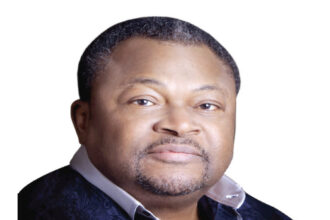The poser that forms the title of this piece is of course, not a novel question to followers of the commentaries on the Nigerian tragic trajectory of social, economic and political development since it gained political freedom from Britain in 1960.It is a question that is often raised by concerned Nigerians when they remember the hope the actualization of independence had raised and now seeing such hope brutally dashed not any more largely by the white officials, but by familiar African fellows who have emerged as internal colonisers and predators instead of dutiful messiahs. At the dawn of anti-colonial struggle, late Kwame Nkrumah of Ghana had charged African political leaders, ”seek ye first political kingdom and all other things will beaded unto it.” Nigerian nationalists heeded this clarion call and won independence for the country 62 years ago. Long enough, many other good things ought to have been added unto it in terms of democratic, economic, infrastructural, educational and general wellbeing gains. However, the narrative has been corrosive and deficit governance, leaving one to wonder whether our leaders really learned any lesson in good governance or did acquire any grain of competency in public service delivery from the colonial masters. Or how did we miss it?
As a national day, Nigerians ought to be celebrating the 62nd anniversary of the country’s independence today, But cam we? Should we? Not really. This is because, in all indices of development,” we have continued to run faster and faster only to stay where we were.” If anything, the account has been zigzag growth without development. On the streets, and in the inner recesses of many homes the question is being asked: what manner of independence is this?
For example, it is worrisome that after the exit of the colonial masters we have found it hard to construct and maintain our social infrastructures: we construct roads only for them to collapse few years afterwards; we can neither provide nor maintain electricity supply for our growing population; provision of pipe born water has remained a mirage; collapsed bridges and impassable roads dot the land; the bureaucracies at all levels have become unrepentantly, sluggish, and corrupt; local governments which were even being nurtured as loci of rural development and efficient service delivery in colonial times, have been robbed of such and reduced to points of salary payment and skeletal administrative duties, shrines for sharing money or dens of mammon. From Lord Lugard to Lyttleton, and up till 1963, Nigerian nationalists demanded for constitutional reforms from our colonial masters and the colonialists did succumb to popular demands. But surprisingly today, under our own self-rule, Nigerian leaders have not only destroyed the true and efficient federal structure the British bequeathed to us, but have consistently remained impervious to correcting the grievous distortion and transgressions. In the British leadership Nigerians found listening ears, but in Nigerian leadership Nigerians have found dump, deaf and inertia.
In the course of my career, I have had opportunity to visit Britain and America, and on every occasion one was always amazed by the state of their infrastructures, their efficient public service delivery and respect for the rule of law. On such occasions, two things often crossed my mind. One, I would wonder and ask: and Nigerian leaders do visit these better climes and cannot replicate what they see here in Nigeria? Why? Two, I would wish at those moments that it is possible for many Nigerians to visit those countries to learn lessons in good governance, human rights and their civic responsibilities so as to be able to challenge their leaders to do good. But thanks to the phenomenon of globalisation, the lid has been opened through information and communication technology. Yet, there has not been fundamental shift in the attitudes of both the government and the governed.
In his seminal work titled “How Europe underdeveloped Africa, Walter Rodney a Guyanese scholar, has demonstrated how slavery and colonialism had arrested African development and technological sprout. Numerous political economists have also demonstrated how imperialism and neo-colonialism have continued to sustain Africa’s financial and human capital depletion. But for how long shall we continue to lament this when our leaders continue to pillage the country dry and run to the colonial capitals to keep their loot? What manner of independence are we talking about? Of recent, when the USA wanted to release another tranche of Sanni Abacha loot to the Nigerian government, it insisted that it would only do so if the money would be committed to the execution of infrastructural projects that would benefit Nigerians. This being the case, have we not lost our independence because of Nigerian shameless leaders’ thieving hands? In 2015, I visited South Africa in company of academic colleagues for a conference and we noticed then that the majority African government in power then was continuing in the high benchmark or quality of provision of social services left behind by the white minority raj. Noticing this, my colleagues and I on the trip raised and debated again the familiar question of whether Nigeria should have tarried a bit before it gained independence from Britain to enable its leaders learn deeper the arts, temper and ethics of good governance which would have possibly enabled the country to avoid the destructive military interregnum it had to pass through. If at 62 as a post -colonial state Nigerians are still suffocatingly labouring under harsh poverty, oppression, gross human rights abuse, injustice, ethnic hegemony, double standards, unresponsive government and repression, where then lies the gain of independence? In the years ahead, Nigerians need to take their destiny in their hands and precipitate revolution without violence. It is only through this concrete political action that genuine emancipation in all ramifications can be won. The time for a second phase of nationalism and wrestle with internal colonialism is just now.
Dr. Adebisi writes from Joseph Ayo Babalola University, Ikeji-Arakeji, Osun state.
ALSO READ FROM NIGERIAN TRIBUNE








